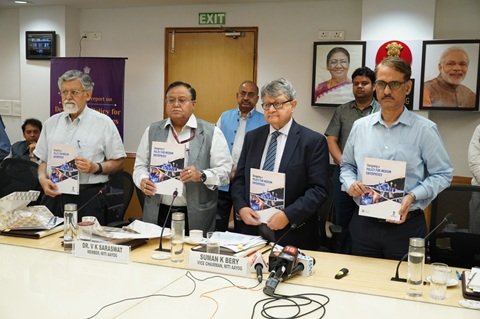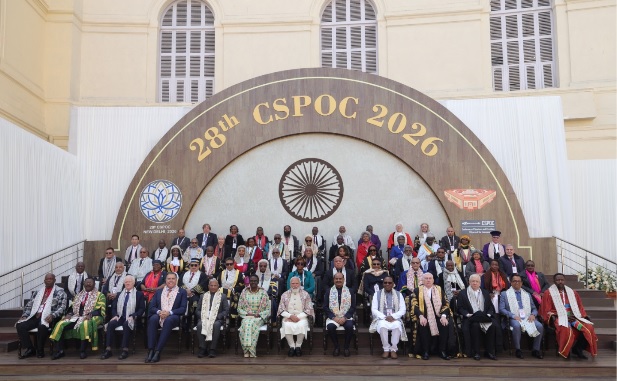
Last Updated on May 26, 2025 6:49 am by BIZNAMA NEWS
R. Suryamurthy
In a significant move to address persistent bottlenecks hindering a vital segment of India’s economy, NITI Aayog today unveiled a comprehensive report titled “Designing a Policy for Medium Enterprises.”
The report, launched by NITI Aayog Vice Chairman Suman Bery, alongside Members Dr. V.K. Saraswat and Dr. Arvind Virmani, directly confronts the critical challenges that have stifled the growth of medium-sized businesses, despite their immense potential as drivers of the nation’s economic vision for a developed India by 2047.
The report not only highlights the crucial yet underutilized role of these enterprises but also directly confronts the significant issues constraining their growth.
The report underscores the substantial contribution of the MSME sector, which accounts for approximately 29% of India’s GDP, 40% of its exports, and employs over 60% of the workforce. However, it critically points out a stark structural imbalance: while micro enterprises constitute a dominant 97% of registered MSMEs, small enterprises make up 2.7%, and medium enterprises a mere 0.3%.
Despite their small numerical footprint, this 0.3% of medium enterprises is a formidable force, contributing nearly 40% of MSME exports. This impressive statistic highlights their immense potential as scalable, innovation-driven units, crucial for leading India’s charge towards self-reliance and global industrial competitiveness.
Crucially, the NITI Aayog report delves into the key challenges directly impeding the growth of medium enterprises. These include:
Constrained Access to Tailored Financial Products: Medium enterprises often struggle to secure financial solutions specifically designed for their unique needs, hindering their ability to fund expansion, modernization, and working capital requirements.
Limited Adoption of Advanced Technologies: A significant barrier identified is the slow uptake of cutting-edge technologies, including Industry 4.0 solutions, which impacts their productivity, competitiveness, and ability to innovate.
Inadequate R&D Support: The report notes a lack of sufficient research and development assistance, limiting their capacity for product innovation and process improvement.
Lack of Sectoral Testing Infrastructure: Enterprises face difficulties due to insufficient sector-focused testing and certification facilities, which can impede product quality, market access, and compliance.
Mismatch Between Training Programmes and Enterprise Needs: Existing skill development initiatives often do not align with the specific requirements of medium enterprises, leading to skill gaps and hindering their ability to find and retain qualified talent.
These limitations, the report emphasizes, collectively hinder their ability to scale, innovate, and contribute more significantly to the economy.
To address these critical issues head-on, the report proposes a robust policy framework encompassing six priority areas:
Tailored Financial Solutions: The introduction of a working capital financing scheme linked to enterprise turnover; a ₹5 crore credit card facility at market rates; and expedited fund disbursal mechanisms through retail banks, overseen by the Ministry of MSME.
Technology Integration and Industry 4.0: Upgrading existing Technology Centers into sector-specific and regionally customized India SME 4.0 Competence Centers to actively promote the adoption of cutting-edge Industry 4.0 solutions.
R&D Promotion Mechanism: The establishment of a dedicated R&D cell within the Ministry of MSME, leveraging the Self-Reliant India Fund for cluster-based projects of national significance.
Cluster-Based Testing Infrastructure: The development of sector-focused testing and certification facilities to streamline compliance processes and enhance product quality across industries.
Custom Skill Development: A strong emphasis on aligning skilling programs with enterprise-specific needs based on region and sector, and the integration of medium enterprise-centric modules into existing Entrepreneurship and Skill Development Programmes (ESDP).
Centralized Digital Portal: The creation of a dedicated sub-portal within the Udyam platform, equipped with scheme discovery tools, compliance support, and AI-based assistance to empower enterprises in effectively navigating available resources.
The report stresses that overcoming these existing challenges and unlocking the full potential of medium enterprises necessitates a paradigm shift towards inclusive policy design and collaborative governance. With strategic support in crucial areas such as finance, technology, infrastructure, skill development, and information access, medium enterprises are poised to emerge as significant drivers of innovation, job creation, and export growth, ultimately accelerating India’s journey towards ‘Viksit Bharat @2047’.







